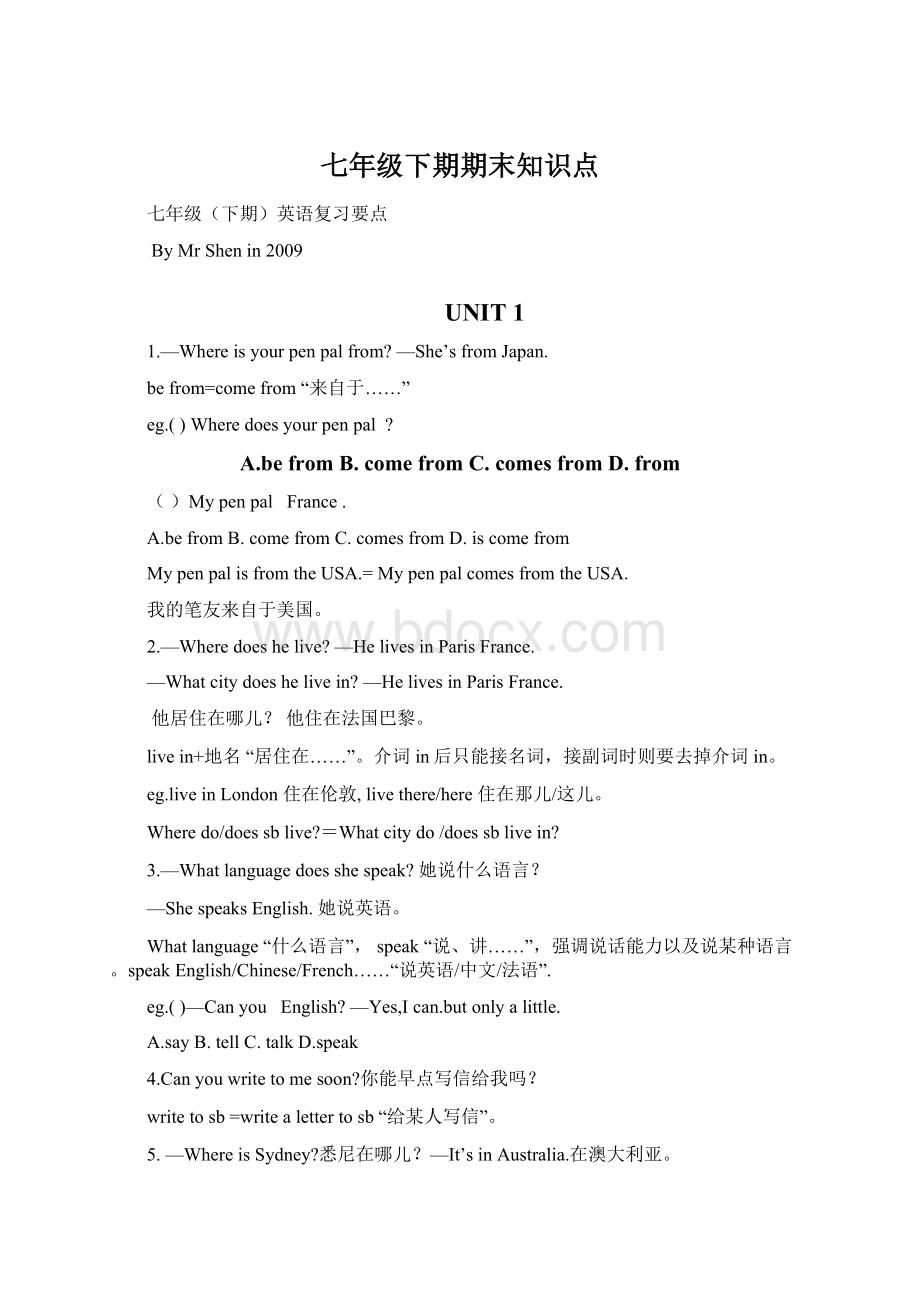七年级下期期末知识点.docx
《七年级下期期末知识点.docx》由会员分享,可在线阅读,更多相关《七年级下期期末知识点.docx(29页珍藏版)》请在冰豆网上搜索。

七年级下期期末知识点
七年级(下期)英语复习要点
ByMrShenin2009
UNIT1
1.—Whereisyourpenpalfrom?
—She’sfromJapan.
befrom=comefrom“来自于……”
eg.()Wheredoesyourpenpal?
A.befromB.comefromC.comesfromD.from
()MypenpalFrance.
A.befromB.comefromC.comesfromD.iscomefrom
MypenpalisfromtheUSA.=MypenpalcomesfromtheUSA.
我的笔友来自于美国。
2.—Wheredoeshelive?
—HelivesinParisFrance.
—Whatcitydoeshelivein?
—HelivesinParisFrance.
他居住在哪儿?
他住在法国巴黎。
livein+地名“居住在……”。
介词in后只能接名词,接副词时则要去掉介词in。
eg.liveinLondon住在伦敦,livethere/here住在那儿/这儿。
Wheredo/doessblive?
=Whatcitydo/doessblivein?
3.—Whatlanguagedoesshespeak?
她说什么语言?
—ShespeaksEnglish.她说英语。
Whatlanguage“什么语言”,speak“说、讲……”,强调说话能力以及说某种语言。
speakEnglish/Chinese/French……“说英语/中文/法语”.
eg.()—CanyouEnglish?
—Yes,Ican.butonlyalittle.
A.sayB.tellC.talkD.speak
4.Canyouwritetomesoon?
你能早点写信给我吗?
writetosb=writealettertosb“给某人写信”。
5.—WhereisSydney?
悉尼在哪儿?
—It’sinAustralia.在澳大利亚。
6.短语:
befrom=comefrom来自于,livein居住在,
gotoamovie/movies看电影,play/dosports做运动,
writetosb给某人写信,penpal=penfriend笔友。
UNIT2
1.Therebe句型的现在时的用法:
表示某地有某物。
Thereis+单数可数名词/不可数名词。
Thereare+可数名词复数形式。
eg.()Theresomemilkintheglass.
()Theresomeorangesinthebasket.
()Thereanorangeonthetable.
()Theresomeorangeintheglass.
A.amB.isC.areD.be
2.问路及指点方向小结:
a.Excuseme.Isthereapostofficenearhere?
请问这附近有邮局吗?
b.Excuseme.Whereisthepostoffice?
请问邮局在哪儿?
c.Excuseme.Whichisthewaytothepostoffice?
请问哪一条路是到邮局的?
(thewayto……到……的路)。
d.Excuseme.HowcanIgettothepostoffice?
请问我怎样才能到达邮局?
指点方向:
Walk/Goalongtheroad/street.沿着这条路走。
It'snextto靠近…/acrossfrom在…的对面/between……and……在……和……之间/infrontof在……的前面/behind在……的后面/ontheright/leftof在左边/右边。
eg.1)这个邮局在超市的对面。
Thepostofficeisthesupermarket.
2)这个邮局在书店和超市之间。
Thepostofficeisthelibrarythesupermarket.
3)这个邮局在超市的前面。
Thepostofficeisthesupermarket.
3.excuseme和sorry的区别。
当我们所说的话或所做的事可能引起对方不便或可能打扰对方时,或者我们要引起对方注意时,比如问路、问问题等,时先常说excuseme译作“对不起”或“打扰一下”等。
当我们做错了事或者说错了话之后表示歉意时应该说sorry,译作“对不起”
eg.()—,canyouhelpmewithmyEnglish?
—,Icant.Iambusynow.
A.Excuseme,SorryB.Sorry,Sorry
C.Sorry,ExcusemeD.Excuseme,Excuseme
4.Thankyouverymuch!
非常感谢你!
―You’rewelcome.不用谢。
表示感谢的表达还有:
Manythanks.Thanksalot/verymuch.
Thankyouforsth.Thankyoufordoingsth.
表示不用谢的表达有:
You’rewelcome;That’sOK/allright;Notatall;It’sa/mypleasure。
5.Nexttothehospitalisasmallhousewithaninterestinggarden.
靠近医院有一座带有有趣的花园的小房子。
句中的with是“含有、带有”的意思,用作定语,修饰前面的名词,说明其性质。
eg.Sheisabeautifulgirlwithlongblondhair.
她是一个长有金黄色长发的女生。
ThemanwithglassesisourChineseteacher.
戴着眼镜的那个人是我们的中文老师。
6.enjoy“喜欢、享受……的乐趣”。
enjoydoingsth“喜欢干某事”。
动词enjoy之后接动词只能用其ing形式(动名词)。
eg.()Myfriend,David,enjoyssoccerafterschool.
A.toplayB.playC.playingD.plays
7.arrive“到达”arrivein+大地名“到达……”;arriveat+小地名“到达……”。
getto“到达、抵达……”,但是接副词home、here或there时,则不能用介词。
get/arrivethere到达那儿。
gethome到家。
eg.()TheyarrivedShanghaithemorningofJune11.
A.in,inB.in,onC.on,inD.at,on
8.短语:
infrontof在……的对面,acrossfrom在……的对面,
arrivein/at到达,nextto靠近……,
between……and……在……和……之间,postoffice邮局
intheneighborhood在附近,gostraight一直走,
turnleft/right向左/右转,ontheleft/right,在左/右边,
payphone投币式公用电话,enjoydoingsth喜欢干某事,
havefun=haveagoodtime玩得高兴/愉快,
UNIT3
1.—Whydoyoulikekoalas?
—Becausetheyarecute.
你为什么喜欢考拉?
因为它们很可爱
why“为什么”,用来对原因提问。
由why引导的句子,回答用because来陈述原因。
eg.—Whydoesshelikecomedies?
—Becausetheyarefunny.
你为什么喜欢喜剧片?
因为他们有趣。
2.kindof“几分、有一点”,常放在形容词之前,修饰形容词。
eg.Ilikepandasbecausetheyarekindofcute.
我喜欢熊猫因为它们很可爱。
kind还有“种类”的意思。
akindof“一种”,manykindsof“许多种”,
allkindsof“各种各样的”,this/thatkindof“这种那种”。
eg.()Ilikepenguinsbecausetheyareinteresting.
A.akindofB.kindofC.kindsofD.kind
3.Shelikestoplaywithherfriendsandeatgrass.她喜欢和她的朋友一起玩和吃草。
a.playwith“玩……、和……玩”,
eg.Heusuallyplayswithhisfriendsonweekends.
他经常和他的朋友在周末一起玩。
b.likedoingsth和liketodosth“喜欢干某事”。
liketodosth常表示一次性动作,也可接表示劳动的动词。
likedoingsth常表示习惯性动作,也可接表示娱乐的动词。
现在一般不做区别了。
eg.Marylikesplayingtheviolininherfreetime.
玛丽喜欢在她的空余时间拉小提琴。
Marylikestoplaytheviolintoday.玛丽今天喜欢拉小提琴。
Helikestocleantheroomontheweekends.
他喜欢在周末打扫房间。
Helikesvisitinghisfriendsontheweekends.
他喜欢在周末拜访他的朋友。
4.一Wherearelionsfrom?
狮子来自于哪儿?
一LionsarefromSouthAfrica.狮子来自于南非。
befrom来自于……,与comefrom同意。
5.短语:
kindof有几分in/duringtheday在白天atnight在夜里
wanttodosth“想要干某事”Let’sdosth“让我们干某事”。
UNIT4
1.—Whatdo/doessbdo?
Whatbesb?
What’sone’sjob?
“某人是干什么的?
”用来对职业提问。
回答:
—Sbbe+职业名词。
eg.—Whatdoyoudo?
/Whatareyou?
/Whatisyourjob?
你是干什么的?
—Iamanactor/areporter.我是一个演员/记者。
我们要掌握“—Whatdo/doessbdo?
—Sbbe+职业名词。
”这个句型。
对职业提问只能用疑问词what“什么工作”。
eg.—Whatdoesyourfatherdo?
—He’sadoctor.
()—Whatdoesyouruncledo?
—.
A.Heisfine.B.HeoftenwatchesTVathome.
C.Heworksinahospital.D.Heisadoctor.
2.—Wheredoesyoursisterwork?
—Sheworksinahostipal.
你姐姐在哪儿工作?
她在医院工作。
Where“在哪儿”,用来对地点提问。
eg.—Wheredoesyourcousinlive?
—HelivesinNewYork.
你的表哥住在哪儿?
他住在纽约。
3.—Whatdoyouwanttobe?
—Iwanttobeanactor.
你长大想干什么?
我想成为一名演员。
句型“Whatdo/doessbwanttobe?
”常用来询问对方将来打算干什么职业。
回答时直接“Sbwant(s)tobe……”说出自己想干的职业或工作。
eg.—Whatdoesyourbrotherwanttobe?
你的弟弟想干什么?
—Hewantstobeasinger.他想成为一名歌手。
4.Iworkwithpeopleandmoney.我和人和钱一起工作。
people“人、人们、人民”,作可数名词,其单复数形式同形。
但是在表示一个人时只能说:
aperson而不能说apeople.如果变成peoples,其意思为“民族”。
eg.Therearemany(people)intheparkonweekends.
5.Thencomeandforusasareporter.
来并且为我们作为记者而工作。
as“作为、当……”。
eg.Mysisterworksintherestaurantasawaiter.
我的姐姐作为一名服务员在这个饭店工作。
6.部分动词转化为名词的规则:
a.一般的在动词后加er构成名词。
eg.clean—cleaner清洁工,work—worker工人,wait—waiter服务员,侍者,report—reporter记者,sing—singer歌手,read—reader读者。
b.以e结尾的动词在后加r构成名词。
write—writer作家,drive—driver司机,dance—dancer舞蹈家。
c.有些动词在其后加or构成名词。
visit—visitor参观者,act—actor演员,invent—inventor发明家。
d.要双写末尾的辅音字母再加er的动词。
swim—swimmer游泳者win—winner获胜者,run—runner跑步者。
7.一般现在时的用法。
一般现在时表示a.现在的状态,如:
Heistwelveyearsold.他十二岁了;Sheisathome.她在家。
b.经常的或习惯性的动作,如:
Igotoschoolat7:
30everyday.我每天7:
30去上学。
c.表示主语具备的性格和能力等,如:
Shelikesapples.她喜欢苹果。
TheyknowEnglish.他们懂英语。
一般现在时常与一些表示频率的词,如:
usually通常,often经常,sometimes有时,everyday(morning,year……)每天(早晨,年……)等连用。
(usually,often,sometimes,every…….等可作为一般现在时的标志词。
)
一般现在时的谓语构成可分为三种:
第一种:
主语+be动词+其他,如:
TheT-shirtis37dollars.
第二种:
主语+情态动词(can)+动词原形+其他,
Hecanplaythepianoverywell.他弹钢琴弹得很好。
第三种:
主语+行为动词(实义动词)+其他,
Heusuallygrtsupat6:
30.。
他通常在6:
30起床。
以下着重讲述谓语动词是实义动词时的句子。
肯定句:
主语(sb)+动词原形(s)+其他。
(注:
动词原形(s)为动词的第三人称单数形式)。
Weoftencleantheclassroomeverymorning.
我们经常每天早晨打扫教室
Theyusuallyplaybasketballafterschooleveryday.
他们通常每天放学后打篮球。
Igotoschoolat8everymorning.我每天早晨8点钟去上学。
Hesometimeshelpshisparentswiththehouseworkathome.
他有时候在家里帮助他父母亲做家务。
当谓语动词是实义动词时,变成否定句或一般疑问句要用助动词do或does【第三人称单数(hesheit)用does,其他人称(I,we,you,youthey等)则用do。
】
否定句:
主语(sb)+don’t/doesn’t+动词原形+其他。
Wedon’toftencleantheclassroomeverymorning.
Theydon’tusuallyplaybasketballafterschooleveryday.
Idon’tgotoschoolat8everymorning.
Hedoesn’tsometimeshelphisparentswiththehouseworkathome.
一般疑问句:
—Do/Does+主语(sb)+动词原形+其他?
—Yes,主语(sb)do/does.No,sbdon’t/doesn’t.
a.—Doyouoftencleantheclassroomeverymorning?
—Yes,wedo./No,wedon’t.
b.—DoTheyusuallyplaybasketballafterschooleveryday?
—Yes,wedo./No,wedon’t.
c.—Doyougotoschoolat8everymorning?
—Yes,wedo./No,wedon’t.
d.—DoesHesometimeshelphisparentswiththehouseworkathome?
—Yes,hedoes./No,hedoesn’t.
7.短语:
shopassistant店员,bankclerk银行职员,
wanttobe想成为……,intheday在白天,
atnight在夜间,ina/thehospital在医院,inhospital住院,anexcitingjob一件有激情的工作,workas……作为……工作,
callsbat#以#(电话号码)打电话给某人。
UNIT5
1.—Whatareyoudoing?
—IamwatchingTV.
你在干什么?
我在看电视。
这两句都用了现在进行时。
现在进行时主要用来表示此刻或现阶段正在发生的事或正在进行的动作。
常与now、atthistime等连用;句中也可有look或listen等词,以引起人们对正在发生的事的注意。
(look,listen,now是现在进行时的标志词。
)
现在进行时的构成:
be(am、is、are)+doing(动词现在分词)sth“正在干某事”。
肯定句:
主语+be(am、is、are)+doing(动词现在分词)sth.
否定句:
主语+be(am、is、are)+not+doing动词现在分词)sth.
一般疑问句:
Be(am、is、are)+主语+doing(动词现在分词)sth?
肯定回答:
Yes,sbbe(am、is、are)。
否定回答:
No,sbben’t(am、isn’t、aren’t)
eg.a.Theyareplayingsoccerballoverthere.他们在那儿踢足球。
—Theyaren’tplayingsoccerballoverthere.
—Aretheyplayingsoccerballoverthere?
—Yes,theyare./No,theyaren’t.
b.Mybrotherisdoinghishomeworkinhisbedroom.
我的哥哥在他房间做作业
—Mybrotherisn’tdoinghishomeworkinhisbedroom.
—Isyourbrotherdoinghishomeworkinhisbedroom.
—Yes,heis./No,heisn’t.
2.动词ing形式的构成规则:
a.一般动词后+ing构成。
eg.play—playingwatch—watching
b.以不发音的e结尾的动词,去e再加ing。
eg.have—havingmake—making
c.末尾只有一个辅音字母并重读的闭音节动词,要双写末尾的辅音字母再加ing。
(坐、跑、放、得到、开始、游泳、购物
eg.sit—sittingrun—runningput—puttingget—gettingbegin—beginningswim—swimmingshop—shopping
d.以ie结尾的动词,要变ie为y再加ing。
eg.lie—lyingtie—tyingdie—dying
eg.
(1).Look.Thekids(play)gamesontheplayground.
(2).Listen.Somestudents(read)Englishintheclassroom.
(3).They(listen)totheteachercarefullynow.
(4).Thestudents(nothave)anEnglishclassnow.They(have)aChineseclass.
(5).—yourparents(watch)TVnow?
—No.They(read)newspapers.
3.Whatareyoutalkingabout?
你们在谈论什么?
talkabout……“谈论(人或物)”。
eg.Theyaretalkingaboutaninterestingmovie.
他们正在谈论一部有趣的电影。
talkto/withsb“和某人谈话”。
eg.Look.Yourteacheristalkingto/withyourparentsoverthere.
看!
你的老师正在那儿和你的父母亲交谈。
4.waitfor……“等候某人”。
eg.—Whoareyouwaitingfor?
—Iamwaitingformylittlebroth